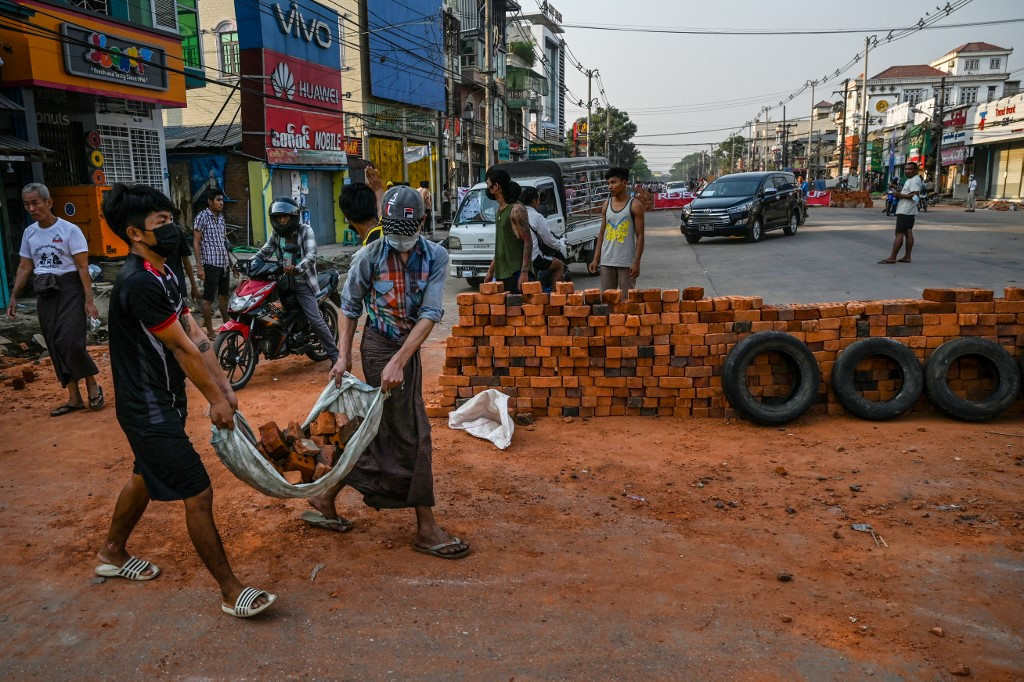Myanmar’s lawmakers tell ASEAN to pick sides
“The question becomes: Is ASEAN standing with the people of Myanmar or are they standing with the military?” said the lawmakers’ special envoy to the United Nations.
Change text size
Gift Premium Articles
to Anyone

A
s the international community hopes for an effective ASEAN response to the Myanmar coup crisis, the regional bloc has taken an informal and familial approach, issuing appeals for restraint as human rights defenders lambast the junta for killing protesters.
But ASEAN statements will not go far unless the bloc makes its stance clear, said Dr Sasa, a special envoy to the United Nations appointed by the Committee Representing Pyidaungsu Hluttaw (CRPH), an interim authority formed by Myanmar’s ousted elected lawmakers.
Since the Feb. 1 putsch, ASEAN’s voice has been split between concerned nations and member states that are unwilling to take a stand on what they consider Myanmar’s internal affairs.
However, the coup regime’s increasing violence against protesters and other citizens of Myanmar has put ASEAN in a tough position, observers have noted.
Sasa, in an interview with The Jakarta Post this week, said the bloc should make clear that there was “no more place for [the junta] in ASEAN” if it continued to cling to power illegally and launch repressive attacks on the people it was supposed to protect.
“If we are ten people in a family and one of our brothers is [committing] a criminal act at home, how would you feel?” the elected Chin state lawmaker asked on Tuesday.
“If he’s killing other people, are the nine other brothers and sisters just going to [keep saying] ‘don’t do that’?”
Read also: 'Shoot till they are dead': Some Myanmar police say fled to India after refusing
ASEAN has framed its diplomatic action on Myanmar as a “family” affair in an effort to counterbalance antagonistic approaches from other powers. Some Western nations have been quick to impose economic sanctions on Myanmar, which often have negative consequences that reach beyond the intended target.
ASEAN has, so far, chosen a path of non-interference, employing a consensus-building approach that many criticize as too slow or cumbersome, but its strategy is backed by top diplomats from the United States and China, as well as other nations supportive of a softer approach.
However, this type of ASEAN strategy has its limits. A similar technique was used in response to the humanitarian crisis in Myanmar in 2017, which saw hundreds of thousands of ethnic Rohingya flee into neighboring Bangladesh following a military crackdown. Repatriation efforts have been unsuccessful.
In the current crisis, Indonesian Foreign Minister Retno Marsudi has taken the lead. Soon after the coup, she embarked on a series of visits in the region to coordinate a collective response, after President Joko “Jokowi” Widodo asked her to initiate a special ASEAN meeting on Myanmar.
The region’s top diplomats met last week with a military-appointed representative in an informal virtual meeting where ASEAN chair Brunei expressed the group’s readiness to assist Myanmar in a positive, peaceful and constructive manner.
At the same time, Indonesia, Malaysia, the Philippines and Singapore released individual statements calling on security forces to exercise restraint, allow for humanitarian intervention and release detained political prisoners, while other member states remained silent on the issue, raising fresh doubts about a unified ASEAN stance.
The CRPH is in the process of establishing a temporary constitution and an interim government in the hope of uniting resistance against the military regime and solidifying their claim to Myanmar’s leadership.
On Wednesday, the CPRH appointed the previously elected speaker of the upper house of Myanmar’s parliament, Mahn Win Khaing Than, acting vice president of Myanmar, according to a letter posted on Sasa's Facebook account.
The CPRH’s government is expected to be in operation by the end of the month.
Read also: Discourse: Myanmar's elected lawmakers to establish provisional government
Sasa said the CRPH was prepared to talk to ASEAN about a “new approach” to Myanmar with a clear mandate from the people.
“The doors are open from our side. We are here to talk and to listen and to make a deal together because they are our brothers and sisters. They are our priority,” he said.
“The question becomes: Is ASEAN standing with the people of Myanmar or are they standing with the military? That is a question we need to ask, and they have to make themselves clear about where they stand.”
According to analysis by Amnesty International, Myanmar’s military has launched “systematic and premeditated killings” against peaceful protesters and bystanders across the country using weapons that are only appropriate for the battlefield, not for policing.
Having analyzed more than 50 videos from Feb. 28 to March 8, Amnesty’s Crisis Evidence Lab has said that security forces are increasing the use of lethal force, with many of the documented killings amounting to extrajudicial executions.
“These Myanmar military tactics are far from new, but their killing sprees have never before been live-streamed for the world to see,” said Joanne Mariner, Amnesty’s director of crisis response, in a statement on Thursday.
More than 60 people are believed to have been killed in the ongoing crackdown.
Even so, the CRPH has indicated its willingness to negotiate with the Tatmadaw, provided its generals and commanding officers are held accountable.
“There will be 10 to 20 people who need to be arrested. They will be the ones who will [need to] face the crimes against humanity they have committed,” Sasa said.
“If we take them out, we are all free. ASEAN will be better without them; Myanmar is better without them.”









